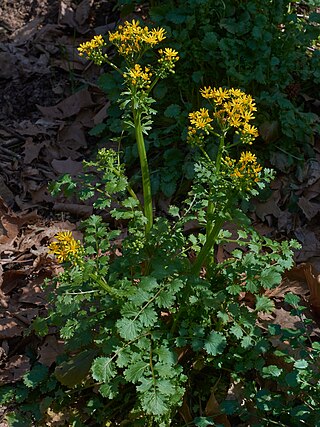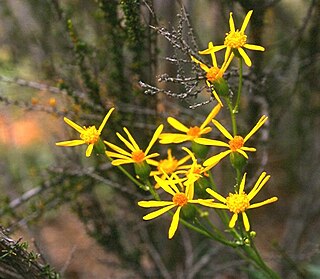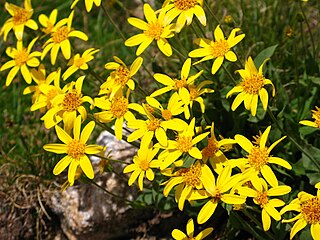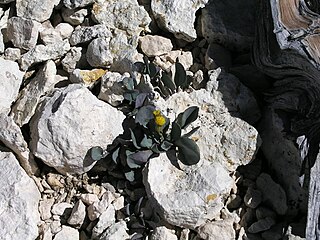
Packera is a genus of about 75 species of plants in the daisy family, Asteraceae. Most species are commonly called ragworts or grounsels. Its members were previously included in the genus Senecio, but were moved to a different genus based on chromosome numbers, a variety of morphological characters, and molecular phylogenetic evidence.

Packera glabella is one of several plants with the common name butterweed, this one has also been called cressleaf groundsel and yellowtop. It is native to central and southeastern North America. It is toxic when eaten by humans.

Packera paupercula is a flowering plant species of the genus Packera and family Asteraceae, native to North America, where it is widespread across Canada and much of the United States. Its common names include balsam ragwort and balsam groundsel. It is a perennial herb that grows 1–3 feet tall. Its habitats include wet meadows, open woodlands, and rocky outcrops.

Polygonum erectum, commonly called erect knotweed, is a North American species of herbaceous plant in the buckwheat family (Polygonaceae). It is found primarily in the northeastern and north-central parts of the United States, but with scattered populations in other parts of the US and also in Canada.

Packera bolanderi is a species of flowering plant in the aster family known by the common names Bolander's ragwort and seacoast ragwort. It is native to the west coast of the United States from Washington to northern California, where it grows in wet coastal forests and woodlands. There are two varieties of the species which differ slightly in morphology and habitat occupied; these varieties have been considered separate species by some authors. The var. bolanderi has thicker leaves, occurs farther south, and occupies more open types of habitat, than does var. harfordii. This plant in general is a perennial herb producing one to three stems up to half a meter tall. The basal leaves have blades up to 12 centimeters long which are divided into several lobes and borne on long, thin petioles. Leaves growing farther up the stem are smaller and have more lobes on their blades. The inflorescence contains several flower heads, each lined with dark green phyllaries. The head contains many golden yellow disc florets and generally either 8 or 13 yellow ray florets each over a centimeter long. The fruit is an achene tipped with a pappus of bristles.

Packera eurycephala is a species of flowering plant in the aster family known by the common name widehead groundsel. It is native to a section of the western United States encompassing southern Oregon, northern California, and northern Nevada. It can be found in dry habitat types, often in disturbed areas, and it favors serpentine soils.
Packera ganderi is a rare species of flowering plant in the aster family known by the common name Gander's ragwort. It is endemic to southern California, where it is known from a few occurrences in San Diego and Riverside Counties.

Packera layneae, known by the common name Layne's ragwort and Layne's butterweed, is a rare species of flowering plant in the aster family.

Packera multilobata is a species of flowering plant in the aster family known by the common name lobeleaf groundsel. It is native to the western United States from California to Wyoming to New Mexico, where it is common and can be found in many habitat types.

Packera streptanthifolia is a species of flowering plant in the aster family known by the common name Rocky Mountain groundsel. It is native to western North America from Alaska to California to New Mexico, where it can be found in mountain habitat including woodlands and rocky slopes.

Packera werneriifolia, known by the common names alpine rock butterweed and hoary groundsel, is a species of flowering plant in the aster family. It is native to the western United States in the Sierra Nevada mountain habitat in subalpine and alpine climates, including forests and barren talus.

Erythranthe michiganensis is a rare species of flowering plant in the lopseed family, known by the common name Michigan monkeyflower. This species occurs only in the Grand Traverse and Mackinac Straits areas within the American state of Michigan. It is one of only three plant species that are endemic to Michigan, with the other two being Voss's Goldenrod and Packera insulae-regalis.

Packera franciscana is a rare species of flowering plant in the aster family known by the common name San Francisco Peaks groundsel, or San Francisco Peaks ragwort. It is endemic to Arizona in the United States, where it is known only from the San Francisco Peaks in Coconino County. It is threatened by recreational activities in its habitat. It is a federally listed threatened species of the United States.
Packera castoreus is a rare species of flowering plant in the aster family known by the common names Beaver Mountain groundsel and Beaver Mountain ragwort. It is endemic to Utah in the United States, where it occurs only in the Tushar Mountains.

Packera malmstenii is a rare species of flowering plant in the aster family known by the common name Podunk ragwort. It is endemic to Utah in the United States, where there about 19 occurrences in the southwestern part of the state.

Packera musiniensis is a rare species of flowering plant in the aster family known by the common names Musinea ragwort and Musinea groundsel. It is endemic to Utah in the United States, where it is known only from Sanpete County in the Manti-La Sal National Forest.

Hasteola suaveolens, known by the common names false Indian plantain and sweet scented Indian plantain, is a perennial forb native to the northeastern and north-central United States. It is found from Massachusetts south to Virginia and North Carolina, and west as far as Minnesota and Minnesota and Missouri.

Packera dubia, synonym Packera tomentosa, is a species of flowering plant in the composite family. It is known by the common name woolly ragwort. It is native to the Southeastern United States, primarily to the coastal plain but extending into some areas inland. Its preferred habitat is open, sandy areas and granitic outcrops. It is common throughout its range.

Liparis liliifolia, known as the brown widelip orchid, lily-leaved twayblade, large twayblade, and mauve sleekwort, is a species of orchid native to eastern Canada and the eastern United States. It can be found in a variety of habitats, such as forests, shrublands, thickets, woodlands, and mountains. The orchid is considered globally secure, but it is considered rare or endangered in many northeastern states.

Ranunculus fascicularis, commonly called early buttercup, is a species of flowering plant in the buttercup family (Ranunculaceae). It is native to the eastern North America, where it is found in Canada and the United States. It is generally widespread in eastern North America, although its populations become sporadic in areas east of the Appalachian Mountains and south of New England. Its natural habitat is in dry areas with sparse vegetation, such as rocky or sandy bluffs, prairies, and savannas.


















